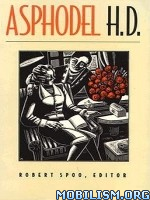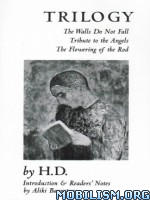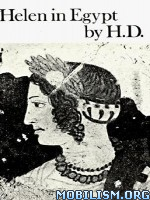3 Books by H.D. (Hilda Doolittle)
Requirements: Epub reader, 889 KB
Overview: H.D., Hilda Doolittle, was born on September 10, 1886, in Bethlehem, Pennsylvania. Her mother a Moravian, and her father an astronomer, she grew up to be what some have called the finest of all Imagist poets. Her accomplishments, though, extended far beyond her early Imagist poems. Her poetry, fiction, and non-fiction writings were published on both sides of the Atlantic, and her roles in a few early films also earned her praise. Most of the awards, including the Gold Medal from the American Academy of Arts and Letters, and the Brandeis and Longview Awards came late in her life, when her poetry had begun to break away from strict Imagism.
Genre: General Fiction/Classics, Poetry
Asphodel
"DESTROY," H.D. had pencilled across the title page of this autobiographical novel. Although the manuscript survived, it has remained unpublished since its completion in the 1920s. Regarded by many as one of the major poets of the modernist period, H.D. created in Asphodel a remarkable and readable experimental prose text, which in its manipulation of technique and voice can stand with the works of Joyce, Woolf, and Stein; in its frank exploration of lesbian desire, pregnancy and motherhood, artistic independence for women, and female experience during wartime, H.D.’s novel stands alone.
A sequel to the author’s HERmione, Asphodel takes the reader into the bohemian drawing rooms of pre-World War I London and Paris, a milieu populated by such thinly disguised versions of Ezra Pound, Richard Aldington, May Sinclair, Brigit Patmore, and Margaret Cravens; on the other side of what H.D. calls "the chasm," the novel documents the war’s devastating effect on the men and women who considered themselves guardians of beauty. Against this riven backdrop, Asphodel plays out the story of Hermione Gart, a young American newly arrived in Europe and testing for the first time the limits of her sexual and artistic identities. Following Hermione through the frustrations of a literary world dominated by men, the failures of an attempted lesbian relationship and a marriage riddled with infidelity, the birth of an illegitimate child, and, finally, happiness with a female companion, Asphodel describes with moving lyricism and striking candor the emergence of a young and gifted woman from her self-exile.
Trilogy: The Walls Do Not Fall / Tribute to the Angels / The Flowering of the Rod
As civilian war poetry (written under the shattering impact of World War II). Trilogy’s three long poems rank with T.S. Eliot’s "Four Quartets" and Ezra Pound’s "Pisan Cantos." The first book of the Trilogy, "The Walls Do Not Fall," published in the midst of the "fifty thousand incidents" of the London blitz, maintains the hope that though "we have no map; / possibly we will reach haven,/ heaven." "Tribute to Angels" describes new life springing from the ruins, and finally, in "The Flowering of the Rod"—with its epigram "…pause to give/ thanks that we rise again from death and live."—faith in love and resurrection is realized in lyric and strongly Biblical imagery.
Helen in Egypt
The fabulous beauty of Helen of Troy is legendary. But some say that Helen was never in Troy, that she had been conveyed by Zeus to Egypt, and that Greeks and Trojans alike fought for an illusion. A fifty-line fragment by the poet Stesichorus of Sicily (c. 640-555 B.C.), what survives of his Pallinode, tells us almost all we know of this other Helen, and from it H. D. wove her book-length poem. Yet Helen in Egypt is not a simple retelling of the Egyptian legend but a recreation of the many myths surrounding Helen, Paris, Achilles, Theseus, and other figures of Greek tradition, fused with the mysteries of Egyptian hermeticism.
Download Instructions:
http://gestyy.com/wX0X17
http://gestyy.com/wX0X2w
http://gestyy.com/wX0X2u



